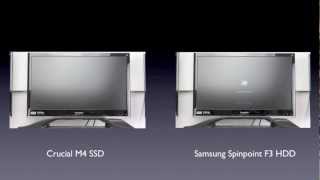Sunday, 18 January, 2026г.
















Где искать: по сайтам Запорожской области, статьи, видео ролики
пример: покупка автомобиля в Запорожье
SSD vs HDD Windows Boot Time Comparison
What difference does an SSD make to OS boot times? Quite a bit. I used the configuration from my gaming build video (http://pcpartpicker.com/blog/intel-core-i5-2500k-geforce-gtx-680-build) to demonstrates the difference.
Both sides are shown real-time - neither is slowed down nor sped up. They both share identical configurations except for hard drive:
- Core i5-2500K CPU (at stock clock speed)
- Hyper 212 EVO CPU Cooler
- Asrock Z68 Extreme3 Gen3 Motherboard
- G.Skill 8GB DDR3-1600 RAM
- Asus GTX 680 Video Card
- Cooler Master Storm Scout Case
For the SSD:
- Crucial M4 64GB SSD (CT064M4SSD2)
(full part list: http://pcpartpicker.com/p/7dUt)
For the HDD:
- Samsung Spinpoint F3 1TB 7200RPM (HD103SJ)
(full part list: http://pcpartpicker.com/p/7dYR)
Both drives have been imaged with the same base windows installation (Windows 7 Home Premium 64-bit). The HDD disk has also been defragmented prior to running to ensure it boots as fast as possible.
As you can see from the video, the SSD solidly trounces the HDD in boot performance (~22 seconds vs ~42 seconds, of which almost 9 seconds is waiting for the BIOS screen to show). The tradeoff is limited storage space (64GB vs 1TB) and a higher price per gigabyte. To get the best of both worlds, use an SSD as the main boot drive and add a traditional hard drive for extra storage space.
Update 4/27/2012:
I reran the launch with the SSD set to AHCI mode instead of IDE mode. This further reduced overall boot time by 1.5s (from 21.2s to 19.7s).
Теги:
spinpoint comparison CT064M4SSD2 PCPartPicker_Benchmark time crucial ssd boot hdd pcpartpicker samsung hd103sj
Похожие видео
Мой аккаунт


 У вашего броузера проблема в совместимости с HTML5
У вашего броузера проблема в совместимости с HTML5


